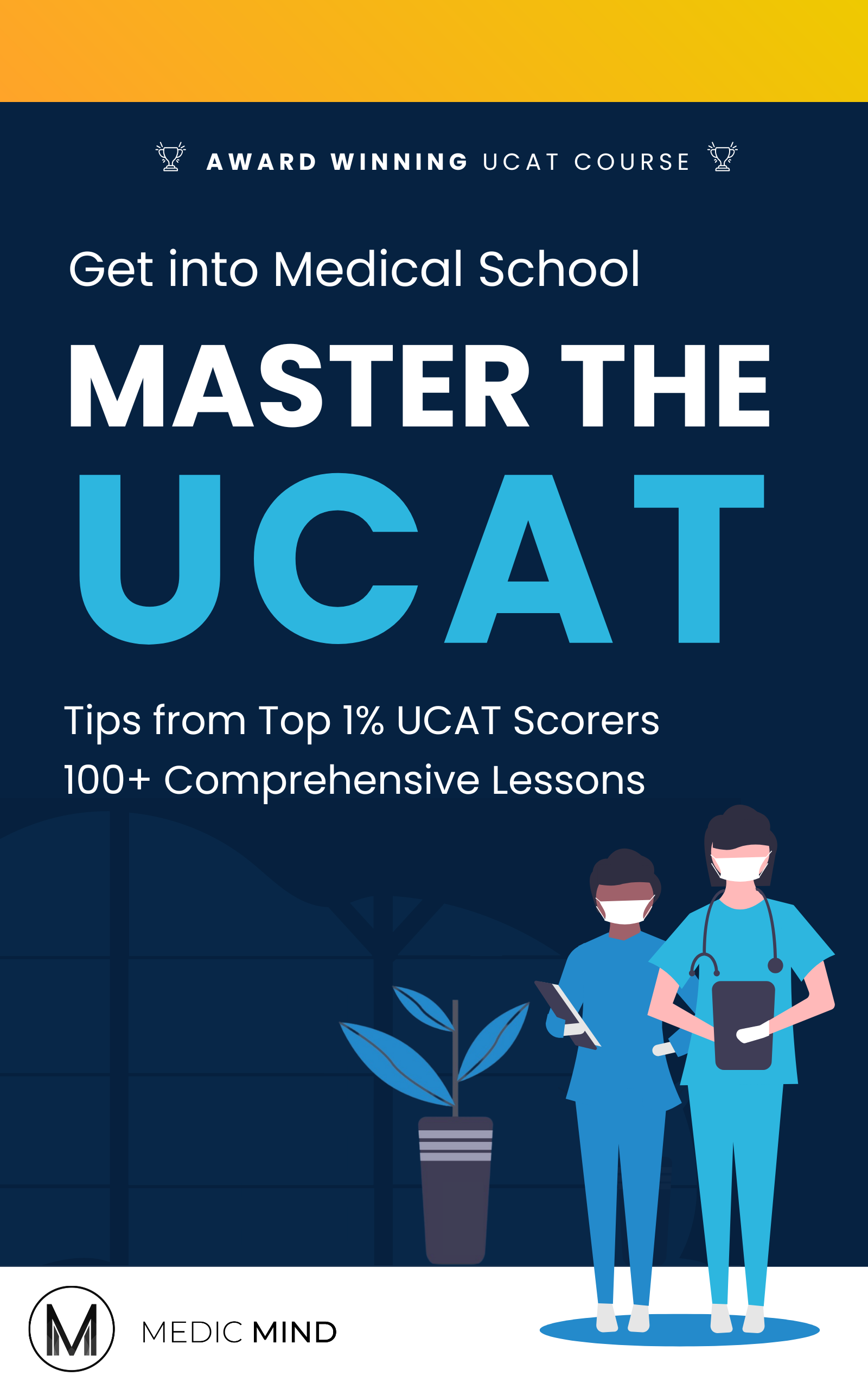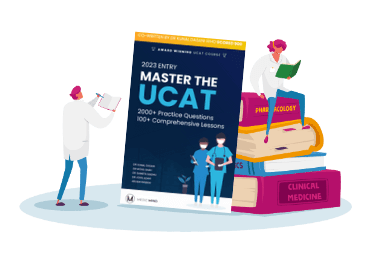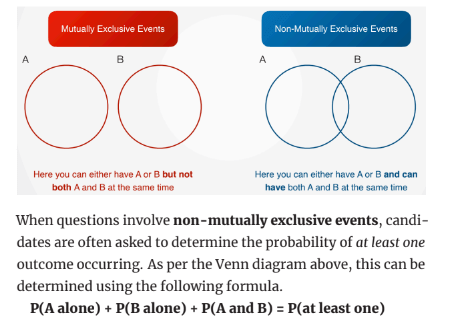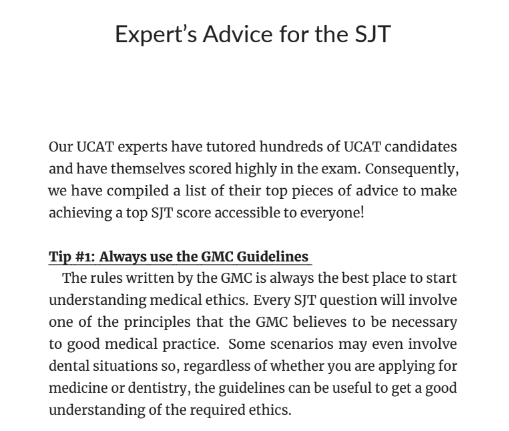
Ultimate UCAT Book
- #1 UCAT Preparation Guide
- Expert Guidance
- 100+ Essential Lessons
- 2000+ UCAT Practice Questions
Master the UCAT: Get Into Medical School
With over 100 lessons and insider tips and tricks from UCAT experts and toppers, ‘MASTER THE UCAT” is brought to you by Medic Mind, an award-winning company of doctors and medical students who tutor students through medical school applications in Australia, and beyond! We’ve helped over 10,000 students with their UCAT, BMAT, Interview, Personal Statements and more! Now, we bring this experience to students around the world with ‘MASTER THE UCAT’, updated for 2024 ENTRY.
Applying for Medicine or Dentistry can be tough! Courses are super competitive, there’s only one shot at your exams and interviews and everyone is scoring high marks. Don’t take a chance on your application, and let the experts at Medic Mind help you to do your best!
CONTENTS:
✓ 100+ LESSONS
✓ EXPERT TIPS ON TIMING AND EFFICIENCY
✓ NEW QUESTION FORMATS FOR 2024 AND BEYOND!
This book has been co-authored by Dr. Kunal Dasani who scored a perfect 900 in 3 out of 4 UCAT sections. Additionally, the other authors have scored in the top 10% of all UCAT performers.
Score 2810+
in UCAT
- #1 UCAT Guide
- Written by Medical Experts
- 2000+ UCAT Practice Questions
- 100+ UCAT Lessons
- UCAT Timming tips
Written By Medical Experts
Award-winning resources
Worked UACT Solutions
Talk to us
within 21 seconds
The best time to start your tutoring journey is today! Speak to our tutors for answers to any questions you have.
How our UCAT
Book works
48% of medicine applications are rejected. The #1 reason? LOW UCAT SCORES. Medic Mind's UCAT Book will help you to improve your UCAT score and ace the exam with flying colours.

How Medic Mind’s UCAT Book Works
Our students love us, but don’t
just take our word for it:

I would not hesitate to recommend Medic Mind to anyone thinking of applying for medicine. I used Medic Mind for UCAT, BMAT, and interview help and it was the best investment I made.

My UCAT tutor Shameena helped me prepare over 7 weeks for the UCAT. She was very motivational, and gave me some really useful tips for each section. Thank you Medic Mind!

As a GEM applicant, a high UCAT score was essential. I was delighted to be paired by an experienced fellow graduate tutor who helped me score well in both UCAT and BMAT.

My UCAT tutor Daniel was very friendly and insightful, helping me score 780 in the UCAT! He taught me some fantastic time-saving techniques for each section of the exam (July, 2019)

Honestly this is the best UCAT scheme available. The whole group were so supportive and replied instantly, from Max to Mohil. The UCAT tutors were great too, especially Cathy and Steph.

The Medic Mind team have been an integral reason for me securing 4/4 offers. I booked 30 hours, which was a good amount for UCAT and used their great videos alongside.

I had 6 hours of 1-1 with Medic Mind, which have been incredibly helpful. Everybody is friendly, knowledgeable and keen to help even if you are short for time.
These have specific strategies that really improved my scores. Not only that, but it is very affordable (especially compared to the majority of courses for the UCAT and BMAT which are heavily overpriced) and the price is for unlimited access to the courses.
With the recent change from UMAT to UCAT, we were worried about how much companies in Australia would know about the UCAT. This is why we were lucky to find Medic Mind!
Really great and informative resources on UCAT and BMAT exam!
Learnt some useful skills for approaching UCAT. Good teaching style. Easy to follow the tutoring.
Brilliant resources, really broke down the ucat exam into the different sections and gave great tips for the various problems. Highly recommend!
The teacher was supportive and friendly when coordinating the UCAT session and helped in clearing any doubts about anything.
It gave important information on the UCAT that I wouldn’t know otherwise. I would like to pass on my thanks to Medic Mind!
Brilliant resources, really broke down the ucat and bmat exam down into the different sections and gave great tips for the various problems: especially abstract reasoning in ucat and essay writing for bmat. Highly recommend!
This course provided great tips and tricks for the UCAT exam, I would recommend it for any med-school applicants. It helped me understand each aspect of the exam and went through in detail how to answer each question style.
The question sets were motivating and challenging, while still remaining similar to the real thing. In order to improve I would personally recommend spending more time on individual slides to give a better chance for mentees to make important notes.
The course I was given really boosted my confidence regarding the UCAT, as it informed me of numerous techniques on how to deductively choose answers for questions, guided me throughout the fundamentals of each section, and taught me how to prepare for this extremely important test.
Thank you so much for helping me out. Went from 60% confidence to 100% so thank you again. The UCAT techniques were unique which I could not find in my books.
As a parent who did not have experience of UCAT previously the advice and support that was demonstrated by medic mind was second to none. Their approach was one of nurturing and care as well as achieving results.
We cover every UCAT Section in the UCAT Book
Verbal Reasoning
Verbal Reasoning is officially the hardest UCAT section – in 2019, the average UK score was 565. In this chapter, we will teach you the optimal approach for each question type, whether its a long scientific passage or a tricky statement question.
Tutorials
Lesson 1
Introduction to VR
To begin with, the book will give you a short overview of Verbal Reasoning, discussing the different types of questions, the UCAT timing and the key challenges you’ll face
Lesson 2
True, False, Can’t Tell
The UCAT Book will teach you the easier True, False, Can’t Tell questions. We’ll discuss what each of these terms actually mean, and practice some questions together.
Lesson 3
Using Inferences
Inferences can change a UCAT statement from Can’t Tell to True. Being able to understand when you can and cannot make an inference is essential to scoring well in Verbal Reasoning.
Lesson 4
Extreme Language
Here we will introduce one of our most effective Verbal Reasoning techniques – Extreme Language. We discuss mild and extreme phrases, and how to spot them in the UCAT.
Lesson 5
Keyword Approach
To answer a Verbal Reasoning question in 30 seconds, you need to use the Keyword Approach. The UCAT Book will introduce this vital technique and then practice using it in UCAT questions.
Lesson 6
Passage Adjustments
Often there can be slight adjustments between the passage and the statement. The UCAT Book will teach you how to spot these, and avoid falling into these common Verbal Reasoning traps!
Lesson 7
Writer Questions
Here we discuss how to approach longer, subjective Writer Passages, including how to quickly find the writer’s conclusion in a long UCAT passage.
Lesson 8
Type 1 Statements
In this chapter, we tackle the more difficult Statement questions, discussing a range of techniques for time-saving and efficient working.
Lesson 9
Type 2 Statements
Here, we teach you how to apply our Verbal Reasoning techniques on the most difficult and long-winded questions in the UCAT – Type 2 Statement Questions.
Lesson 10
Factual Passages
In this chapter, we teach you how to successfully tackle the more complicated, abstract passages containing multiple numbers, facts and fine details.
Lesson 11
Timing Strategies
In this chapter, we consolidate all of the timing techniques we’ve learnt thus far, alongside introducing some new tips for beating that UCAT timer in Verbal Reasoning!
Lesson 12
Reverse Questions
Reverse or Negative Questions often trick UCAT students up. We’ll teach you how to spot them and answer them well in a limited amount of time.
Lesson 13
Timing Contingencies
What do you do if you have 10 questions left to do in 5 minutes? Don’t worry, we’ll guide you through our contingency Cheetah and Rabbit strategies just in case things go wrong!
Lesson 14
Causation vs. Correlation
It’s easy to make assumptions on links and correlations between UCAT statements. In this UCAT Book chapter, we’ll go through some tricky examples to teach you an important skill.
Lesson 15
VR Test Day
In this chapter, we’ll give you a week by week plan for your Verbal Reasoning preparation. We’ll also discuss how to perform at your best on UCAT Test Day.
Lesson 16
Tips from the Experts
We close up the Verbal Reasoning course with some final tips from our UCAT experts, all of whom scored above 850 in the exam.
Lesson 17
Summary and Overview
In this chapter, we re-cap all of the key UCAT Verbal Reasoning techniques we’ve taught you.
Decision Making
Decision Making is a relatively new section but also the hardest to grasp in terms of techniques. Read our award-winning techniques to help you maximise your score in a challenging but fun section!
Tutorials
Lesson 1
Introduction
To begin with, the UCAT Book will give you a short overview of Decision Making, introduce the 6 question types and identify the key challenges faced.
Lesson 2
Syllogisms: Theory
The UCAT Book will teach you our evidence-based method for tackling Syllogisms using Venn Diagrams. It is quite a detailed UCAT chapter so brace yourself!
Lesson 3
Syllogisms: Questions
The UCAT Book will help you now put this into practice by going through questions based on the official UCAT Consortium.
Lesson 4
Venn Diagrams I
There are lots of questions which require you to draw a Venn without even telling you! It’s a key part of Decision Making and you need to get familiar with it early.
Lesson 5
Venn Diagrams II
The UCAT Book will put these techniques into practice and give you an array of questions designed to test you to your limit.
Lesson 6
Probability: Theory
Whether you have a basic or expert level of knowledge of maths, Decision Making Probability will give you a refresher and help you cover the content in detail.
Lesson 7
Probability: Questions
After covering the content you will put it into practice and go through UCAT Probability Questions.
Lesson 8
Logic Puzzles: Theory
This is a favourite for UCAT Decision Making authors and a question style bound to trip up many so pay attention to this one!
Lesson 9
Logic Puzzles: Questions
Logical Puzzles in Decision Making require lots and lots of practice so read through our walkthrough to help guide you through it all.
Lesson 10
Ordered Puzzles
In this UCAT Book chapter we will go through how to answer ordered puzzle questions as well as covering vital theory to help you score 800+.
Lesson 11
Tabular Puzzles
UCAT Decision Making tends to have lots of information in tables and they purposely distract you with overload of information. Learn how to tackle these questions.
Lesson 12
Spatial Equations
These have come up in the past two years of the UCAT Decision Making based on our research so it’s an important question type to get your head around.
Lesson 13
Conditional Scenarios
Here we get to grips with how UCAT Decision Making requires you to have two-step thinking and help you take shortcuts.
Lesson 14
Interpreting Data
It’s crucial to know how to consolidate pieces of information in UCAT Decision Making and score highly by not being fooled by distractors.
Lesson 15
Assumptions: Theory
UCAT Recognising Assumption questions are relatively straightforward but we discuss the common pitfalls that students face in the UCAT Book.
Lesson 16
Assumptions: Questions
These are the easiest type of UCAT Decision Making questions however it helps to get 100% in these questions to set you up for the rest of it.
Lesson 17
Tips from Experts
Read the thoughts of our UCAT Decision Making experts who will give you their insight into how they did well in this area and what they found useful.
Lesson 18
Summary
Here we wrap up everything we’ve taught you and help condense everything into the salient points as well as giving you the next steps on how to formulate your revision.
Quantitative Reasoning
We approach Quantitative Reasoning by systematically working through the 15 key question types that appear in the UCAT. Whether it be Percentages, Ratios, Fractions, Venn Diagrams, Tax Questions or Areas, we’ve got you covered!
Tutorials
Lesson 1
Introduction to QR
The UCAT Book will take you through an overview of Quantitative Reasoning. What is the timing? What types of questions commonly come up? What are the key challenges?
Lesson 2
Estimation vs. Precision
A key technique for saving time is estimation. The UCAT Book will teach you when to estimate, how to estimate, and work through different UCAT scenarios to challenge your technique.
Lesson 3
Reading The Information
It’s crucial to understand when to read the QR question stem, and when to skim read. The UCAT Book will go over how to recognise the type of question, and the approach to take.
Lesson 4
Units in the UCAT
In this UCAT Book chapter, we will take you through unit variation in questions, common units traps, unit conversions and time-saving tips for units questions.
Lesson 5
Means, Median, Mode
Using our UCAT Book, you will work through realistic UCAT scenarios relating to means, weighted means, median and longer time-consuming data calculations.
Lesson 6
Area Questions
UCAT area questions can often be challenging, time-consuming and tricky. Using our UCAT Book, you’ll tackle the most common area questions, teaching you some successful strategies.
Lesson 7
Quantitative Formulae
In this chapter, we will introduce the common UCAT formulae and test you with some examples – including UCAT questions on the area of a cylinder, volume of a sphere, diameter of a polygon, use of pi and much more.
Lesson 8
Ratios
You often need to use ratios within UCAT questions, whether it be in a map scale, or calculating proportions of items. Ratios can be tricky, but don’t worry we have you covered!
Lesson 9
The UCAT Calculator
The UCAT Calculator really slows you down. The UCAT book will teach you how to use it quickly and efficiently using our proven shortcuts. We’ll also discuss the UCAT Whiteboard and Flagging function.
Lesson 10
Fractions
Being able to use and convert fractions is a very useful skill for UCAT Quantitative Reasoning. Using our techniques, by the end of this chapter fractions we will make ‘fractions your friend’!
Lesson 11
Interest Questions
Compound interest, simple interest, interest calculations – these are common nightmares for UCAT students. In this chapter,we will challenge you with some time-consuming exams.
Lesson 12
Tax Questions
Tax bracket calculations have commonly been asked in the UCAT, and students struggle to get their head around them. In this chapter, the UCAT Book will work through many examples to overcome your fear!
Lesson 13
Venn Diagrams
Being able to use, draw and understand Venn Diagrams is an essential skill in both the Quantitative Reasoning and Decision Making sections of the UCAT
Lesson 14
Percentages
Percentages are almost guaranteed to come up in the UCAT! We teach you a unique, super fast method for percentage change, increase and proportions.
Lesson 15
Speed, Distance, Time
In this UCAT Book chapter, we will take you through examples relating to the Speed, Distance, Time Formula. We will teach you how to avoid common traps for these questions (e.g. unit traps).
Lesson 16
Tips from Experts
We close up the Quantitative Reasoning course with some final tips from our UCAT experts, all of whom scored above 850 in the exam. The UCAT book will share some of their own personal closing tips.
Lesson 17
QR Test Day
In this chapter, we’ll give you a week by week plan for your Quantitative Reasoning preparation. We’ll also discuss how to perform at your best on UCAT Test Day.
Lesson 18
Summary and Overview
In this chapter, we will re-cap all of the key UCAT Quantitative Reasoning techniques we’ve taught you.
Abstract Reasoning
Abstract Reasoning is a tricky section to grasp especially as there are so many different patterns you could get! We’ll teach you award-winning methods to help you crack through the questions using pattern recognition techniques.
Tutorials
Lesson 1
Introduction
In this chapter, we will give you an overview of Abstract Reasoning, including a summary of question types, the common pitfalls and the key techniques required.
Lesson 2
AR Question Types
There are 4 Abstract Reasoning question types. In this chapter, your UCAT Book will introduce each one, and discuss the differences in approach, timing and difficulty.
Lesson 3
Warm Up Quiz
In this chapter, the UCAT Book will warm you up with some practice patterns before you jump into trickier sets later on. You’ll be able to see how AR works, and understand how to spot patterns.
Lesson 4
Type 1 Questions
Type 1 questions are the most common type in Abstract Reasoning. We will discuss the ideal strategy for these questions, and practice some sets. The UCAT Book will also share their personal tips for Type 1 Questions.
Lesson 5
The SPONCS Method
In this chapter, we will summarise the key types of patterns that appear in the UCAT, including Shape, Position, Orientation, Number, Colour and Size patterns.
Lesson 6
AR Triggers
In AR, you haven’t got enough type to look for every pattern from SPONCS. You need to spot triggers, which will guide you towards the right direction and save crucial time.
Lesson 7
Number Patterns
In this chapter, will teach you how to look for common Number patterns, including the number of sides, number of total shapes, number of intersections and much more.
Lesson 8
Shape Patterns
In this chapter, will teach you how to look for common Shape patterns, including presence of a specific shape, symmetry, curved vs. straight-sides, regular vs. irregular and much more.
Lesson 9
Size Patterns
The UCAT Book will teach you how to look for common patterns relating to the relative size of shapes, including common combinations of Size with other pattern types.
Lesson 10
Position Patterns
The UCAT Book will teach you how to look for common Position patterns, including position of shapes in quadrants, rotation and much more.
Lesson 11
Colour Patterns
In this chapter, we will teach you how to look for common Colour patterns, including patterns involving grey, black, striped and spotted shapes. Colour patterns are often combined with other pattern types.
Lesson 12
Orientation Patterns
In this chapter, we will teach you how to look for Orientation patterns, including patterns involving direction, arrows and relative position of shapes.
Lesson 13
Distractors
UCAT questions often have distractor shapes and boxes, which are designed to waste your time. We’ll explain how to spot them, avoid them and focus on the important shapes.
Lesson 14
Dependent Patterns
Sometimes patterns involve two steps, whereby one pattern depends on another pattern. These questions can be tricky, so we will practice them and discuss the best approach.
Lesson 15
Secondary Patterns
Sometimes sets have two patterns – one major pattern, and one minor pattern. We will discuss when to look for a second pattern, and when to save time and move on.
Lesson 16
Timing Strategies
Abstract Reasoning is the quickest UCAT section. It can fly by, so it’s especially important to be sharp with your timing. The UCAT Book will teach you how to spot patterns efficiently and quickly.
Lesson 17
Type 2 Questions
Type 2 Abstract Reasoning questions involve a series of shapes, with the question asking you to finish the series. The UCAT Book will take you through examples, and teach you how to approach them.
Lesson 18
Type 3 Questions
Type 3 Abstract Reasoning questions involves spotting relationships between pairs of shapes. The UCAT Book will take you through several examples, and again discuss the best approach.
Lesson 19
Type 4 Questions
Type 4 Abstract Reasoning questions involve a similar approach to Type 1 questions, with a slight twist. The UCAT Book will test, discuss and perfect your technique for these questions.
Lesson 20
AR Test Day
In this UCAT Book chapter, we’ll give you a week by week plan for your Abstract Reasoning preparation. The UCAT Book will also discuss how to perform at your best on UCAT Test Day.
Situational Judgement
We approach Situational Judgement by working through the GMC Guidelines and Medical Ethics to help you understand the ethical knowledge and grasp the technique required to secure Band 1.
Tutorials
Lesson 1
Introduction to SJT
The UCAT Book will breakdown the different question types you can get in the Situational Judgement section of the exam and help you adjust to the skills required here.
Lesson 2
Appropriateness
In this chapter, we will introduce the “appropriateness” type of questions and lay out a step by step strategy on how to answer questions related to this.
Lesson 3
Importance
The UCAT Book will introduce the “importance” type of question in Situational Judgement and help you understand how to differentiate between very important and not important at all
Lesson 4
Tackling the Scenario
The UCAT Book will share our expert strategy which has been devised by current doctors and medical students based on their insight into the clinical environment.
Lesson 5
Knowing Your Role
When you are faced with a scenario, you have to identify the status and profession of the person involved. E.g. capabilities and responsibilities of a GP will be very different to that of a Medical Student.
Lesson 6
Key Principles
The UCAT Book will give you an overview of the principles of situational judgement including patient safety and professionalism. You will learn which of these are most important in a clinical setting.
Lesson 7
Patient Safety
The most important thing you are taught as a medical student is to always be safe! It is drilled in and is the most important quality in medicine. The UCAT Book will share experiences on the hospital wards!
Lesson 8
Working with Remits
This applies in particular to situations revolving around medical students – Medical students are not authorised to make decisions surrounding medical care or give any treatment.
Lesson 9
Confidentiality
Confidentiality is important for many reasons – this includes patient trust in the profession. Patients are often anxious to come to doctors and so when they do inform them of information they expect that it will not be told to anyone else
Lesson 10
Professionalism
Doctors and dentists should be responsible in healthcare setting and outside healthcare settings. This means that all students and doctors should act responsibly as they are representing a whole profession
Lesson 11
Honesty & Integrity
Everyone makes mistakes and it’s important that if mistakes are made that we follow the right protocol to identify them. You should not directly influence patients’ decision – the modern model of healthcare is patient centred – we want patients to be at the heartbeat of their decisions.
Lesson 12
Teamwork & Respect
No one is above anyone else – it’s why doctors and nurses wear the same type of scrubs. We go through common SJT scenarios around this and help you spot key patterns in their questions.
Lesson 13
Duties of a Doctor
Here we condense the GMC Principles in chapters with UCAT practice questions. The UCAT Book will go over different personal experiences into the duties of a doctor in the hospital.
Lesson 14
GMC #1: Performance
The UCAT Book will take you through the first GMC principle of Knowledge, Skills & Performance and go through Situational Judgement questions around it.
Lesson 15
GMC #2: Safety
The UCAT Book will take you through the second GMC principle of Safety and Quality and go through Situational Judgement questions around it.
Lesson 16
GMC #3: Teamwork
The UCAT Book will take you through the third GMC principle of Communication, Partnership & Teamwork and go through Situational Judgement questions around it.
Lesson 17
GMC #4: Trust
The UCAT Book will take you through the fourth GMC principle and go through Situational Judgement questions around it.
Lesson 18
Medical Pillars
The UCAT Book will discuss the 4 Key Medical Pillars and walk you through real life SJT scenarios to help you get to grips with the exam.
Lesson 19
Tips from the Experts
The UCAT Book will share some final tips from their experience of the Situational Judgement section of the UCAT.
Lesson 20
Test Day
The UCAT Book will answer any remaining worries you have going into test day, helping you to feel prepared and relaxed before your UCAT!















